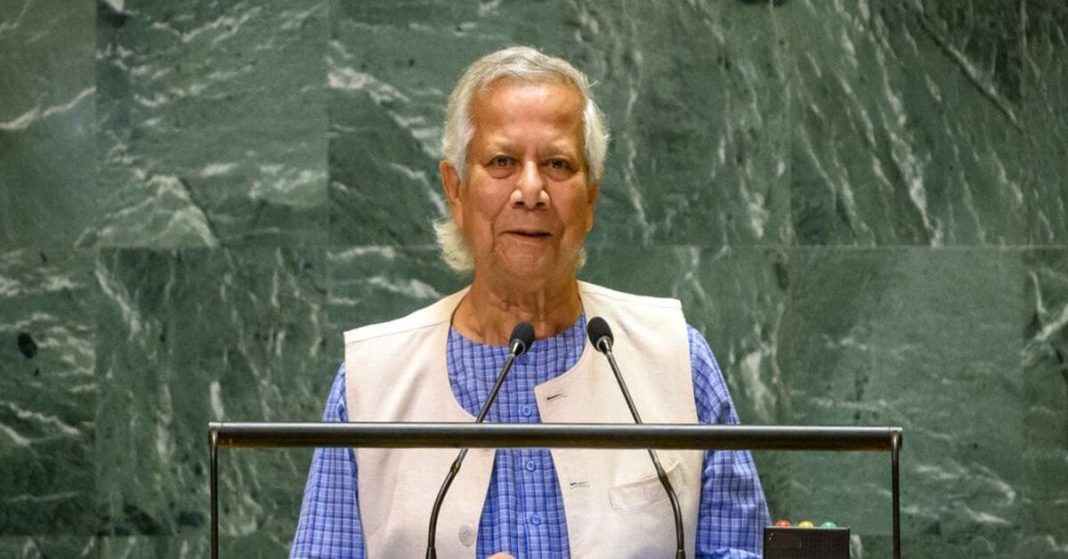As Bangladesh’s interim government led by Chief Advisor Muhammad Yunus seeks to recalibrate its foreign policy, in its growing ties with Pakistan and China, it berated India for several reasons, including providing shelter to former PM Sheikh Hasina, in a discussion on the sidelines of UNGA 2025.
Speaking on the silence of the United Nations General Assembly session, Bangladesh Chief Adviser Mohammad Yunus talked about reviving SAARC, Dhaka’s strained ties with Delhi and the student protest last year, and India’s hosting of Bangladesh’s former Premier Sheikh Fazeena Hajat following her ouster following the student protests last year.
Yunus Slams India for Sheltering Hasina
“We have problems with India right now because they didn’t like what the students have done,” he remarked. Accusing India of providing shelter to Hasina, stated, “India is hosting Hasina, who has created problems…that creates tension between India and Bangladesh.”
He discussed reviving SAARC, the South Asian Association for Regional Cooperation, with Bangladesh serving as a bridge for regional trade and ocean access. While explaining the problem of SAARC’s dysfunctional status, Yunus again said that New Delhi’s political resistance has blocked regional cooperation.
“We wanted to bring this together so that young people can get in touch with each other – all regions, not just one country, all the countries, they can visit each other, make friends with each other, study in universities, colleges, wherever they are, they can do business in each other’s country. That was the whole idea,” Yunus said.
“Our histories allow us to make that happen, but somehow it didn’t fit into the politics of one country, so we had to stop that. So we feel very sorry for that. We want to make sure we open it up and bring people together,” he said. He also dismissed the propaganda calling for the rise, labelling the rise of Islamic fundamentalism in Bangladesh as fake news.
He made the comments during a meeting with Sergio Gordo, U.S. Special Envoy for South and Central Asia and U.S. Ambassador-designate to India. The SAARC held its last summit in 2014. The next meeting of the planned block in 2016 was canceled following the terrorist attack in Uri, for which India blamed Pakistan.
Earlier this year, in February, Bangladesh sent all necessary documents to India to request the extradition of Sheikh Haseena. However, the extradition request conveyed through a note remains unanswered by India.
Commenting on the statements of Muhammad Yunus, Indian defence analyst and commentator Praveen Sawney, seems to agree with the comments made by Muhammad Yunus, in his tweet he said that How China was being stopped from becoming the member of the SOC and then later the ODI attack in IIOJK, in 2016 India’s refusal to attend the SOC in Islamabad officially left the organisation formally defunct.
“Yunus is right. It so happened that at the SAARC summit in Nepal in 2014, four members- Nepal, Sri Lanka, Pakistan & Maldives- proposed that China be made a full member of SAARC. India did not accept this since this would end its regional hegemony. Then, Uri terrorists attacked in J&K in 2016 & India refused to attend the 2016 SAARC summit in Islamabad. So, it was the end of SAARC for India,” Pravin Sawhney said.
Yunus is right. It so happened that at the SAARC summit in Nepal in 2014, four members- Nepal, Sri Lanka, Pakistan & Maldives- proposed that China be made full member of SAARC. India did not accept this since this would end its regional hegemony.
Then, Uri terrorists attack in… https://t.co/bk5ncrTE2E— Pravin Sawhney (@PravinSawhney) September 25, 2025
Pakistan and Bangladesh Look Beyond the Past
On the other hand, Pakistan’s Prime Minister, Shahbaz Sharif, and Bangladesh’s Chief Advisor, Muhammad Yunus, met at the sidelines of the United Nations General Assembly in New York. According to the Chief Advisor’s Press Secretary, Shafiq-ul-Alam, the meeting on Wednesday focused on failed and economic ties between Pakistan and Bangladesh.
Read more: Has India Kicked China Out of Nepal? Why Pakistanis Can’t Bring Change? Editor GVS…
Prime Minister Muhammad Shehbaz Sharif held a bilateral meeting with Chief Adviser of Bangladesh Prof. Muhammad Yunus on the sidelines of 80th Session of UNGA.
During the warm and cordial meeting, the two leaders reviewed the current state of Pakistan-Bangladesh bilateral… pic.twitter.com/5GMYZY363W
— Prime Minister’s Office (@PakPMO) September 25, 2025
This marked the second meeting between Yunus and Sharif, the first being on the sidelines of last year’s UNGA meet. Pakistan and Bangladesh are looking forward to mending their ties following the ouster of Prime Minister Sheikh Hasina Wajid. The relations between the two Muslim countries remained strained for the 15-year rule of the former Awami League government due to issues such as the 1971 war and criminal trials in Bangladesh and broader regional politics.
Since the formation of the interim government led by Yunus in August 2024, Pakistan and Bangladesh are once again looking forward to warming up their ties. Last month, Pakistan’s Deputy Prime Minister and Foreign Minister Ishaq Dar made a two-day official visit to Dhaka, marking the first state-level visit of any Pakistani official to Bangladesh in 13 years. He also met former Bangladeshi Prime Minister Ishaq Dar. So far, both countries have agreed to move beyond their difficult past towards stable diplomatic, cultural, and economic ties.
From GVS South Asia Desk














